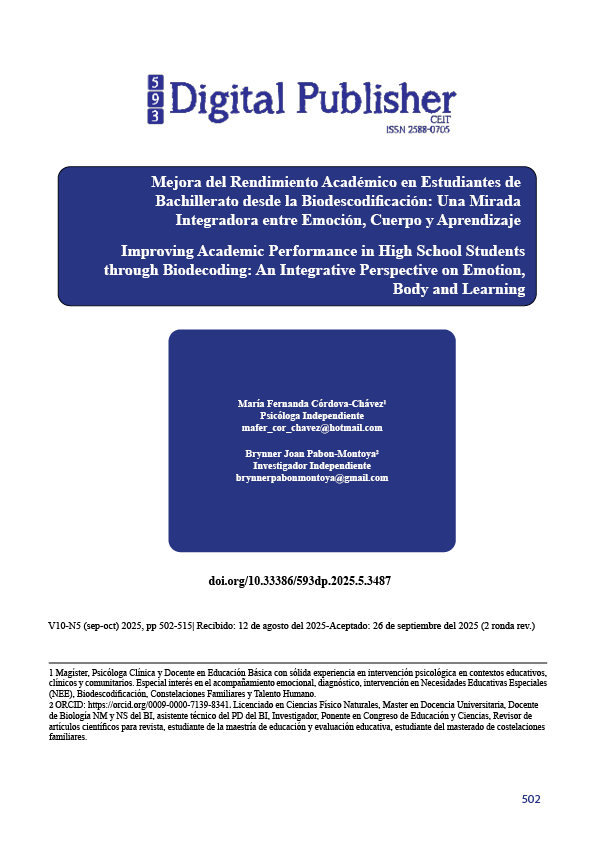Mejora del Rendimiento Académico en Estudiantes de Bachillerato desde la Biodescodificación: Una Mirada Integradora entre Emoción, Cuerpo y Aprendizaje
Contenido principal del artículo
Resumen
Se analizó las problemáticas del bajo rendimiento académico en estudiantes de bachillerato, desde una perspectiva integradora, considerando que no solo factores pedagógicos inciden en el bajo rendimiento, también se ven involucrados elementos emocionales, familiares y transgeneracionales. El presente estudio se fundamenta en teorías de la inteligencia emocional, neuroeducación y enfoques sistémicos transgeneracionales. El fin de la investigación es evaluar si la biodescodificación genera cambios importantes en los promedios de nota en estudiantes de 3er año de bachillerato, aplicando un análisis estadístico para evidenciar las diferencias. La metodología utilizada es de enfoque mixto, con diseño de campo, con una muestra no probabilística. Los resultados arrojan que los bloqueos académicos tienen su origen en emociones no gestionadas, lealtades familiares inconscientes y conflictos no resueltos que se manifiestan simbólicamente en la conducta del estudiante. Concluyendo que la inclusión de herramientas como la biodescodificación en contextos educativos puede enriquecer la comprensión de los síntomas escolares y aportar soluciones más humanas y profundas.
Descargas
Detalles del artículo

Esta obra está bajo una licencia internacional Creative Commons Atribución-NoComercial-CompartirIgual 4.0.
1. Derechos de autor
Las obras que se publican en 593 Digital Publisher CEIT están sujetas a los siguientes términos:
1.1. 593 Digital Publisher CEIT, conserva los derechos patrimoniales (copyright) de las obras publicadas, favorece y permite la reutilización de las mismas bajo la licencia Licencia Creative Commons 4.0 de Reconocimiento-NoComercial-CompartirIgual 4.0, por lo cual se pueden copiar, usar, difundir, transmitir y exponer públicamente, siempre que:
1.1.a. Se cite la autoría y fuente original de su publicación (revista, editorial, URL).
1.1.b. No se usen para fines comerciales u onerosos.
1.1.c. Se mencione la existencia y especificaciones de esta licencia de uso.
Citas
Caballero, A., García, A., & Olivares, S. (2020). Neuroeducation and emotional learning: Towards a comprehensive understanding of student development. International Journal of Cognitive Research in Science, Engineering and Education, 8(2), 93–102. https://doi.org/10.23947/2334-8496-2020-8-2-93-102
Corbera, E. (2017). El arte de desaprender. Ediciones Obelisco.
Dispenza, J. (2014). Deja de ser tú: La mente crea la realidad. Urano.
Damasio, A. (1994). El error de Descartes: emoción, razón y cerebro humano. Crítica.
Extremera, N., & Fernández-Berrocal, P. (2004). El papel de la inteligencia emocional en el alumnado: Evidencias empíricas. Revista Electrónica de Investigación Educativa, 6(2), 1–17.
Fernández-Berrocal, P., Gutiérrez-Cobo, M. J., & Cabello, R. (2021). Emotional intelligence and academic performance: A meta-analytic review. Frontiers in Psychology, 12, 667373. https://doi.org/10.3389/fpsyg.2021.667373
Flèche, C. (2009). Las bases de la biodescodificación. Barcelona: Ediciones Obelisco.
González, L., & Martínez, P. (2021). Factores emocionales y familiares en el rendimiento académico de estudiantes de secundaria. Revista Iberoamericana de Psicología Educativa, 34(2), 45–59. https://doi.org/10.1234/ripedu.2021.34.2.45
González-Valero, G., Zurita-Ortega, F., Ubago-Jiménez, J. L., & Puertas-Molero, P. (2021). Emotional regulation and academic performance in secondary school: The mediating role of academic self-efficacy. Sustainability, 13(6), 3023. https://doi.org/10.3390/su13063023
Hernández Sampieri, R., Fernández Collado, C., & Baptista Lucio, P. (2014). Metodología de la investigación (6.ª ed.). McGraw-Hill.
Jodorowsky, A. (2009). La biodescodificación: Nuevas puertas para sanar. Ediciones Roca.
MacCann, C., Jiang, Y., Brown, L. E. R., Double, K. S., Bucich, M., & Minbashian, A. (2020). Emotional intelligence predicts academic performance: A meta-analysis. Psychological Bulletin, 146(2), 150–186. https://doi.org/10.1037/bul000021.
Medina, J. (2008). Brain rules: 12 principles for surviving and thriving at work, home, and school. Seattle: Pear Press.
Rodríguez-Ledo, C., Mendaña-Cuervo, C., & González-González, H. (2022). Academic performance and cooperative learning: The role of emotional competencies. Thinking Skills and Creativity, 44, 101028. https://doi.org/10.1016/j.tsc.2022.101028
Perroni, R. (2013). Biodescodificación: La salud emocional como base del bienestar. Ediciones EDAF.
Sabbah, C. (2013). La enfermedad como camino de curación: El sentido biológico y emocional de los síntomas. Barcelona: Editorial Sirio.
UNESCO. (2020). Global education monitoring report 2020: Inclusion and education – All means all. París: UNESCO.
Zhao, S., Zhang, X., & Wang, Y. (2023). Predictors of academic grades: The role of interest, effort, and stress. Journal of Research in Personality, 105, 104392. https://doi.org/10.1016/j.jrp.2023.104392



